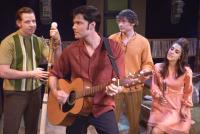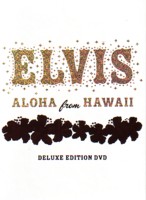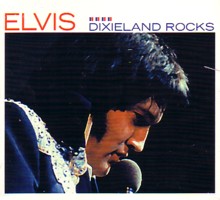Julian Stone’s theater presentation:
The Elvis Test
|
Elvis’ Bad Trip
....Acid reflux...
By STEVEN MIKULAN
(Source: LAweekly.com, 9 June 2007)
Julian Stone’s The Elvis Test (Elephant Theater) is a clever if cautious imagining of the only time, apparently, that Elvis Presley took LSD. The play is set just after Christmas 1965, at Presley’s Graceland mansion, where the King would feel secure enough to indulge in a little mind-bending with friends. Still, Presley (Faran Fonté) is clearly apprehensive about dropping his sugar cube, as most people then knew little about LSD beyond lurid stories about users jumping off buildings or burning out their retinas staring at the sun. He’s joined by girlfriend Priscilla Beaulieu (Monica Allgeier) and two members of his Memphis Mafia: major-domo Steve (Jon-Barrett Ingels), and Harlan (Michael A. Bachmann), who functions as gofer and a kind of court fool. The party’s acid test is rounded out by Elvis’ drug and spiritual enabler, a hip tailor-turned-mystic named Carl (a wonderfully wispy and airy Andrew McGinnis).
|
 |
The play is a story of people crippled by insecurities and codependencies, and Stone sketches these vividly. Elvis, egged on by Steve, has come to realize that his deference to manager Colonel Tom Parker has led his career away from music to making schlock movies aimed at family markets. (In 13 years, astonishingly, Presley made 31 films.) At this point, the singer is also undergoing a period of self-realization, thanks to his guru, Carl. None of these changes pleases Priscilla, his future wife, who constantly worries that Elvis is going to dump her for Ann-Margret or one of his other movie co-stars.
Stone gives us a humanizing peek into the claustrophobic life of a collapsing star. His Elvis is a short-tempered control freak and mama’s boy who won’t let Priscilla earn a living, but who showers her and other friends with gifts. He is also irritated and more than a little scared by the Beatles’ success — and miffed that his quest for personal discovery is seen by some as merely a me-too response to the Fab Four’s flirtation with Eastern beliefs. Not surprisingly, he is the last of the group gathered at Graceland to surrender to LSD’s grip and experiences the least-enjoyable trip. Still, the release of his repressed fears brings a decisive clarity to Elvis, and Act 1 ends with his decision to rebel against the Colonel.
The gag is that just as Elvis begins to transform himself back into his old, touring persona, Steve and Carl both realize this will leave them out in the cold — no more Hollywood connections for Steve, no more designing of Elvis’ meditation garden for Carl. Certainly, there will be no need for a whipping boy like Harlan, whose chief talent is his knack for taking distracting tumbles whenever divisive arguments break out between Elvis and his flunkies. In other words, Elvis’ new determination to say No means there won’t be a place for yes men. Even Priscilla winds up half-persuaded that Colonel Parker’s advice is best for Elvis, since at least moviemaking will confine the King’s peccadilloes to the kind of Hollywood career women who would never marry a man who would demand that they stop acting.
“The problem,” Steve realizes, “isn’t what’s missing. The problem is what’s here. . . . What’s best for Elvis isn’t always best for us.”
As an observer of human behavior, Stone is very generous with his secondary characters, all of whom come with fully developed grudges and hurts. As a character study, though, The Elvis Test is almost too focused on its star. That Elvis is at a professional crossroads is hammered home over and over. And when the King’s selling out for movie money isn’t being talked about, it’s embodied by the ghost of Elvis’ brother, Jesse Garon (Will Beinbrink), a rockabilly avatar in a black leather jacket and cuffed Levi’s. Jesse is the sibling Elvis never knew, his twin brother who died at childbirth. In the play, he appears as a kind of alternative Elvis — or, perhaps, the genuine Elvis, the Elvis that might have been had he remained true to his music roots. But is he really necessary?
An extreme alternative would have been to make this play a story about hangers-on by completely eliminating Elvis and keeping his presence nearby but offstage — the same way in which Stone allows us to feel the Colonel’s suffocating influence. A less radical direction would have been a Midsummer Night’s Dream approach, simply having Elvis, under the spell of LSD, continually postpone his big career decision, while the other characters experience various epiphanies and breakdowns.
The playwright faces an obvious obstacle — we know how this story ends. Elvis never stood up to Colonel Parker and in a very major sense never fulfilled the promise of his early music career. (One historical point Stone stresses is that while the Beatles and other British Invasion bands wrote their own songs, Elvis was content to sing what others wrote for him — and unlike, say, Patsy Cline or Frank Sinatra, he didn’t work with lyricists who particularly shared or understood his background and persona.)
Watching The Elvis Test, however, you can’t help but wonder if its potential for Chekhovian satire could double by pouring a little more LSD into the Kool-Aid and loosening the strict demands of wants and needs that tightly govern Stone’s narrative. As it now stands, acid simply provides a chemical reagent that explains Elvis’ speeded-up decision-making process, but it doesn’t lend a disorienting asymmetry to the plot’s rhythm and logic.
There’s something of a parallel here with the film version of Tracy Letts’ thriller Bug, which is also receiving an excellent L.A. stage premiere at the Coast Playhouse. This paranoid fable of codependency is about a pair of recently met lovers shacked up in an Oklahoma motel room. Amid the rumble of hovering helicopters and passing semis, the pair come to believe they have become the hosts for a colony of tiny insects — planted on them by government scientists. Much of the play’s suspense comes from exploiting our need to figure out if the bugs are real or not (in the same way we want to know if Gregor Samsa has actually turned into a giant cockroach or only believes he has). It’s fairly clear in Bug’s stage version that the lovers’ fears are exaggerated by their crack pipe. In William Friedkin’s new film, though, it’s far more ambiguous, and this uncertainty makes audiences feel a little more had. The moral is: Blame it on the drugs and everyone will understand. Similarly, The Elvis Test feels a little too neat and linear, given its hallucinogenic inspiration.
On opening night, at least, the first scene of director Gary Spatz’s production of The Elvis Test was noticeably lifeless, but picked up in Scene 2. The show has some strong weapons in its arsenal, not the least of which are Summer Ramsey’s spot-on costumes and a living-room set design by Davis Campbell and Danny Cistone that looks something like Johnny Cash Meets Shag. More important, though, all the actors are thoroughly committed to making their roles believable and sympathetic. This is especially true of Michael A. Bachmann’s sad harlequin, Harlan. It would have been very easy to paint this buffoonish character by the numbers, but Bachmann makes sure we feel the psychic pain inflicted by each of his staged pratfalls — falls, he rationalizes, that hold his marriage together. Fonté turns in a very watchable Elvis — he’s got the sneer, the voice and the exaggerated hand gestures down. Fonté’s only problem is that he’s noticeably younger than the 30-year-old Elvis was in 1965. This might sound like a quibble, but it makes a difference when the actor more resembles the Elvis who first walked into Sam Phillips’ recording studio than a mature man desperately seeking to find a second act to his faltering career.
THE ELVIS TEST | By JULIAN STONE | At ELEPHANT THEATER, 6322 Santa Monica Blvd., Hlywd. | Through July 1 (323) 960-7738
|
|







